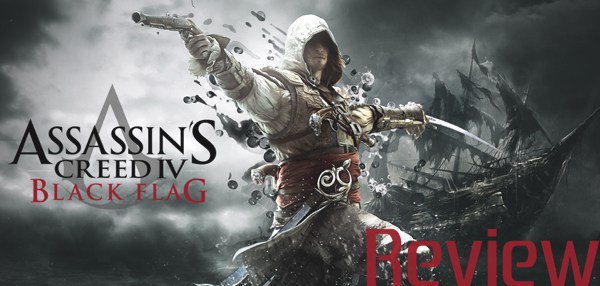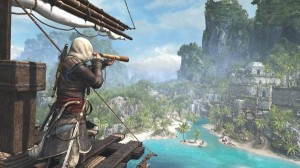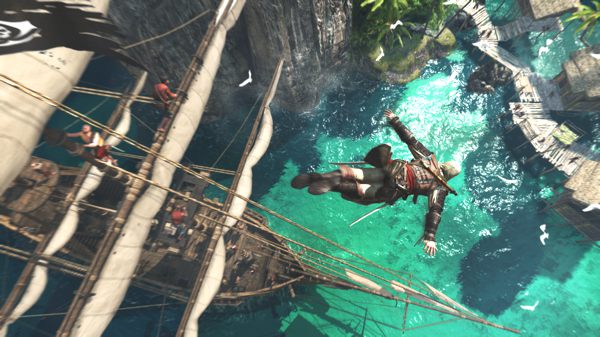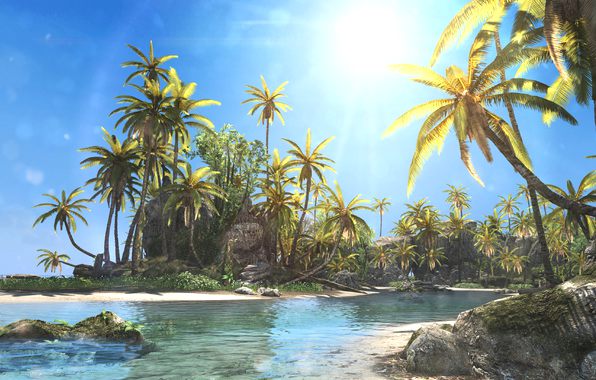
There’s something to be said for trying something different. Taking a chance, bucking the trend, eschewing the conventional. Unfortunately, that’s not something said too often about the Assassin’s Creed franchise. Since the seminal Assassin’s Creed II in 2009, Ubisoft Montreal’s tentpole franchise has been reliant upon building on what worked, little by little, while letting some mechanics idle and age with each passing release. With Assassin’s Creed IV: Black Flag, the follow up–and partial prequel–to last year’s Assassin’s Creed III, Ubisoft has pushed forward a little bit more, maybe enough to be something that’s a must-buy for any PlayStation 4 owners.
 Very clear from the get-go in Black Flag is that this isn’t your typical Assassin’s Creed game, and that ends up being a good thing. As much as I personally have enjoyed the narrative structure of the series, last year’s anticlimactic ending to the story of Desmond Miles was just that: a conclusion; and all that is left are the threads to be picked up upon. In a clever meta twist, the present-day through line revolves around Abstergo Entertainment, and the Animus has gone commercial. Your unnamed first-person character is a member of the testing team, exploring the life of Edward Kenway and living the life of a privateer (read: pirate) in the early 18th Century.
Very clear from the get-go in Black Flag is that this isn’t your typical Assassin’s Creed game, and that ends up being a good thing. As much as I personally have enjoyed the narrative structure of the series, last year’s anticlimactic ending to the story of Desmond Miles was just that: a conclusion; and all that is left are the threads to be picked up upon. In a clever meta twist, the present-day through line revolves around Abstergo Entertainment, and the Animus has gone commercial. Your unnamed first-person character is a member of the testing team, exploring the life of Edward Kenway and living the life of a privateer (read: pirate) in the early 18th Century.
The bulk of your time is spent in the Animus–indeed, I spend more than 25 hours on the single player campaign alone–but there are some fun aspects of the ‘real world’ story line that brought some genuine smiles to my face. Between hacking work stations to reveal more about Abstergo, the history of the Animus, and what happened to Desmond, and some familiar faces from games’ past popping up, there’s actually a reason to step out of the game-within-a-game from time to time. But when you’re not busy hacking computers and chatting with French-Canadians, you’ll be spending the majority of the time in the swashbuckling, sea-sailing, shanty-singing boots of Edward Kenway. And you spend plenty of time buckling swashes, I can tell you without a doubt.
 Unlike the slow-starting Assassin’s Creed III, Black Flag thrusts you headlong into the briny deep in your very first mission. (And if you’re getting tired of pirate puns by now, you may want to stop reading.) From the get-go, the pirate life is where Assassin’s Creed IV shines. Instead of confining seafaring missions to specific instances and side-quests, the Caribbean is your playground in Black Flag. From the southern tip of Florida to the Yucatan to Jamaica, Cuba, and Haiti, this might be one of the largest worlds that Ubisoft has ever laid to code.
Unlike the slow-starting Assassin’s Creed III, Black Flag thrusts you headlong into the briny deep in your very first mission. (And if you’re getting tired of pirate puns by now, you may want to stop reading.) From the get-go, the pirate life is where Assassin’s Creed IV shines. Instead of confining seafaring missions to specific instances and side-quests, the Caribbean is your playground in Black Flag. From the southern tip of Florida to the Yucatan to Jamaica, Cuba, and Haiti, this might be one of the largest worlds that Ubisoft has ever laid to code.
The danger of creating such an expansive map is that there’s going to be a lot to see but little to do. This is, by no means, the case with Black Flag. Just over the next crest of a wave or around the cliffs of the Cuba coastline is another quest or some small island with a treasure chest or collectible to grab, perhaps a small convoy to pillage or a Galleon to overpower and add to your pirate fleet. Beyond the game’s primary story, there’s a whole world of things to do. Much of my time was spent hopping from island to island, collecting Reales to upgrade my ship, the Jackdaw, as I sought greater prizes to the south, where pirate hunters and Man o’ Wars were frequent adversaries. Attacking and conquering Forts, Black Flag‘s version of Templar towers and British colonial forts from games past, reveal locations and items on the map–though, with the exception of some story-related locations, the entire map is yours to explore as soon as you’re given command of your vessel.

Black Flag‘s story is the first that doesn’t fall in line chronologically with those that have come before. While Assassin’s Creed II, and her sequels Brotherhood and Revelations, came after the first Assassin’s Creed, and likewise Assassin’s Creed III followed Ezio’s stories several hundred years hence, Assassin’s Creed IV: Black Flag explores the Edward’s life in the early 1700’s, decades before the adventures of his grandson Connor in ACIII. Edward is a different animal than any of your assassins’ past; he’s brash, reckless, and has a morality and drive that run contrary to the Creed for which the series takes its name. In fact, Edward’s ties to the assassin order make for some of the more compelling parts of the narrative, and his travels bring him in contact with legendary pirate figures like Charles Vane, Woodes Rogers, Benjamin Hornigold, and Edward Teach (aka Blackbeard).
The story wasn’t my driving factor to complete the game. No, in fact it was the beautiful world crafted by Ubisoft Montreal that kept me going, and it’s stunningly realized on the PlayStation 4. There are plenty of articles detailing just how crisp the graphics are at sites devoted to such details, but once you actually get playing and experience the difference that the higher resolutions and frame rates actually can do for a game like Assassin’s Creed, it’s hard to deny the lure of this new generation. Of course, because Assassin’s Creed IV is still straddling the lines of last-gen technology and the power PC that’s in Sony’s new box, there are some minor things that still stand out. While the water and plant life of Black Flag is among the best I’ve seen, facial animations and pigmentation are still just a bit off. Characters looks just a bit too plastic, and hair doesn’t quite fall off the head and face like it ought to. Despite these issues, Black Flag looks fantastic, and played with very few hitches–most of them inflicted because of my own lack of precise button timing during combat or while navigating the environment.

One gripe I do have with the game, that hasn’t been fixed even two months out of release, is regarding the network interface–specifically if you have more than 100 Friends on your PSN profile. One of my favorite features of the game, Kenway’s Fleet, was a key part of my late-game progress in earning Reales toward upgrades, acquiring collectibles, and more. Accessible through Ubisoft’s uPlay servers, it’s a fun mini-game that allows you to use captured vessels to trade between your stronghold in the Caribbean to the American colonies, Europe, South America, and Africa. However, if you happen to have more than 100 Friends, a glitch prevents you from connection to uPlay servers–thus rendering you unable to access Kenway’s Fleet. I hope that this is an issue addressed as Ubisoft’s engineers become more accustomed to the PlayStation 4’s network services, but for now, it’s a glaring omission in an otherwise well-designed game.
If you’re a fan of what Ubisoft has done with Assassin’s Creed‘s multiplayer since its introduction in Brotherhood, you’ll enjoy what they’ve brought to Black Flag. Because it’s practically the same thing. The object of many of the game modes is simple: blend in as one of a number of characters and try to pick off your opponents without being detected. You earn points for silent stealth kills, killing people from cover, and so on, as has been the case for the past three games. There are objective-based matches, team-based, free-for-all, and they’re fun–in fact, Assassin’s Creed multiplayer has ranked among my favorite since it was introduced, because it’s so different from the twitch-based first person gun games or the cover-based fare that’s common in third person. But with naval combat such a highlight of Black Flag‘s primary story progression, it’s a shame that they couldn’t have found a way to bring it to multiplayer this time around.
Assassin’s Creed IV: Black Flag boasts some great visuals for the new generation of consoles, and is a welcome addition to the PlayStation 4’s launch lineup. The character of Edward Kenway brings some of the fun back to the series that Ezio Auditore introduced in Assassin’s Creed II, and while his story might not be as compelling as his Italian predecessor, the world he explores is very much so. Whether you’re invested in the ongoing Assassin versus Templar intrigue or just want to leap from the deck of your ship onto a frigate and take down her captain, Black Flag gives you the freedom to set sail and play the way you want. Is it entirely revolutionary? No, but what it does right feels like a solid foot forward for a series that at times felt bogged down by the weight of its own importance. Ubisoft has done something different: they’ve backed away from what didn’t work, and focused heavily on what did. Should you play Assassin’s Creed IV on PS4? Yes, absolutely, and I can’t wait to see what’s next for this refreshed franchise.
The SonyRumors review of Assassin’s Creed IV: Black Flag was played on a retail PS4 copy of the game provided by Ubisoft.
Discuss
Is Assassin’s Creed IV: Black Flag a must-play on PS4? Are you glad to see the franchise continue into “next-gen”? Let us know in the comments!
